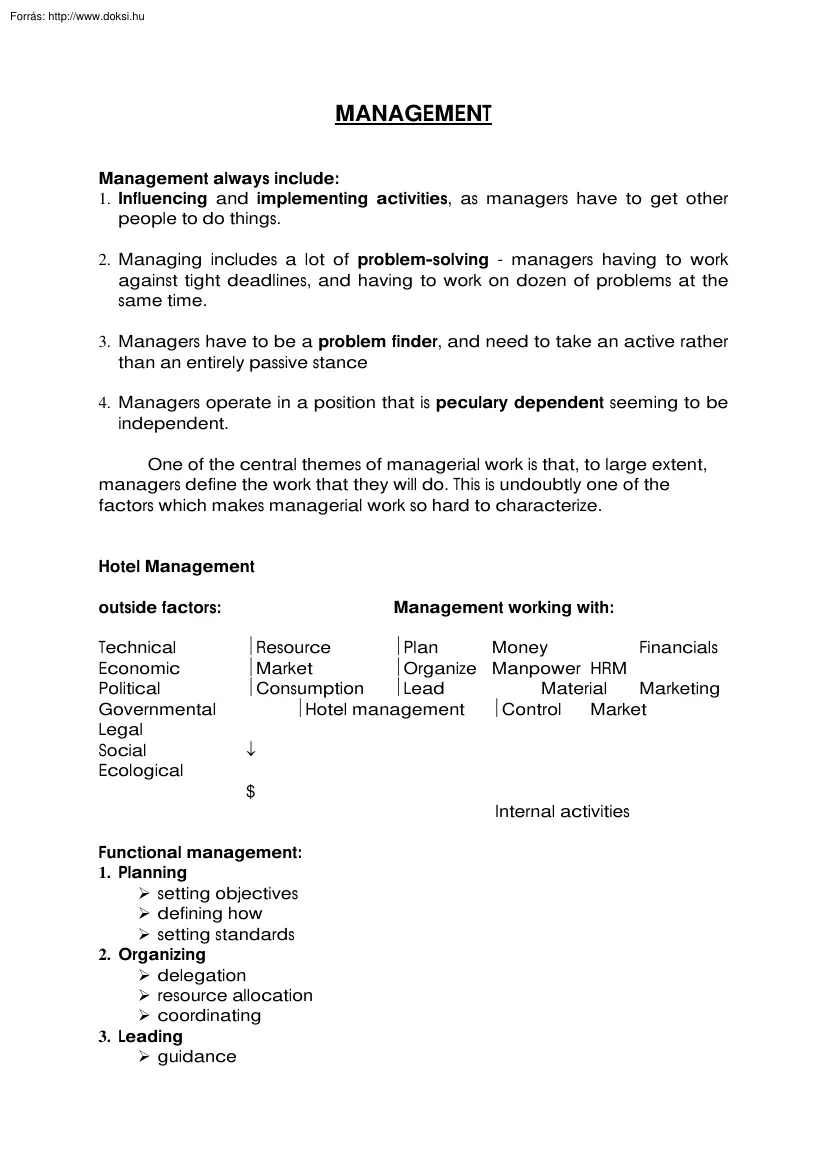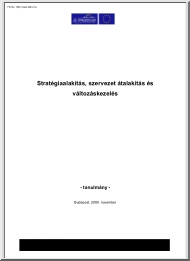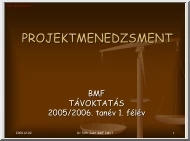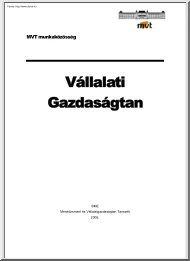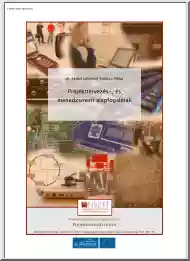Értékelések
Nincs még értékelés. Legyél Te az első!
Mit olvastak a többiek, ha ezzel végeztek?
Tartalmi kivonat
MANAGEMENT Management always include: 1. Influencing and implementing activities, as managers have to get other people to do things. 2. Managing includes a lot of problem-solving - managers having to work against tight deadlines, and having to work on dozen of problems at the same time. 3. Managers have to be a problem finder, and need to take an active rather than an entirely passive stance 4. Managers operate in a position that is peculary dependent seeming to be independent. One of the central themes of managerial work is that, to large extent, managers define the work that they will do. This is undoubtly one of the factors which makes managerial work so hard to characterize. Hotel Management outside factors: Technical Economic Political Governmental Legal Social Ecological Management working with: Resource Plan Money Financials Market Organize Manpower HRM Consumption Lead Material Marketing Hotel management Control Market ↓ $ Functional management: 1.
Planning setting objectives defining how setting standards 2. Organizing delegation resource allocation coordinating 3. Leading guidance Internal activities motivation integration 4. Control monitoring connection supervising A manager has three roles to play: 1. Interpersonal roles: figure head: legal authority, ceremonial duties, role model leader - motives others connector - link between the members of the organization 2. Informational roles: nerve center / focal point disseminator - passes on information speaker - the higher the role, the more speaks! , have to motivate 3. Decisional roles: entrepreneur: you are willing to change and respond to change disturbance handler / problem solver - interviews when unexpected situations demand action respond allocate - budget, people, equipment negotiator - represents the organization in negotiations with third parties Characteristics of successful
managers: ability to learn enthusiastic self-motivated attention to details hard working responsible creative persistent determined has problem solving skills self reliance emotional stability good communication skills success orientation planning and organizing skills self-confident has a vision strong conviction in that vision behave out of the ordinary perceived as change agent Key characteristics of a good leader: vision elaguence consistency commitment well-informed willing to empower and delegate political astuteness Charismatic leaders are: dynamic inspiring outgoing sociable insightful enterprising New contemporary management ideas, practices and techniques As the traditional management has become far too complex, there have been new initiatives for radical transformation of management practices and adoption of new paradigm of the modern
management. Some of the new management ideas, concepts and their characteristics: 1. Flatten the structure! flat is ‘beautiful’ modern companies are like orchestras: one conductor, hundreds of players downsizing, delayering improved communications lower costs speeder decision making better motivation decisive role of front line personnel ‘less management is better management’ 2. The action approach management is action ‘ready, aim, shoot’ key words: move, inspire, empower, lead, stimulate set vision and urge people into action 3. Ready made techniques give solutions to problems When problem s arise, pick up and implement one of the ‘right’ techniques or programs, like: portfolio planning value based planning nieche techniques TQM benchmarking core process reengineering gainsharing etc. 4. The corporate class ‘model organizations are like families’ create corporate culture
that guides to understand what is good or bad 5. The board of directors as ‘watch dogs’ remove management influence from board room exercise critics No doubt the shift from the traditional management theories to the contemporary management fads can be considered as positive response to change in the businesses (globalisation, new information technologies, new production technologies etc.) do not follow these ideas blindly! do not trivialize management! should be evaluated by sound reasoning find and use the positive elements of the false trail and be professional! To be professional: 1. Professionals have good ideals to follow, which might include: giving good service to others creating, improving continuously building socially productive organizations finding pleasure in work 2. Professional are mastering a craft or body of knowledge such mastery takes years of learning and experience. 3. The professional knowledge is based on sound
reasoning and not on dogma or unproven rules. They are willing and able to criticize current beliefs and recognize that there ate different kinds of reasonings. 4. Professionals are able to use language clearly and precisely 5. Professionals operate according to high ethical and technical standards They respect both the letter and the spirit of laws that govern their operations. They apply their knowledge and skills carefully and diligently
Planning setting objectives defining how setting standards 2. Organizing delegation resource allocation coordinating 3. Leading guidance Internal activities motivation integration 4. Control monitoring connection supervising A manager has three roles to play: 1. Interpersonal roles: figure head: legal authority, ceremonial duties, role model leader - motives others connector - link between the members of the organization 2. Informational roles: nerve center / focal point disseminator - passes on information speaker - the higher the role, the more speaks! , have to motivate 3. Decisional roles: entrepreneur: you are willing to change and respond to change disturbance handler / problem solver - interviews when unexpected situations demand action respond allocate - budget, people, equipment negotiator - represents the organization in negotiations with third parties Characteristics of successful
managers: ability to learn enthusiastic self-motivated attention to details hard working responsible creative persistent determined has problem solving skills self reliance emotional stability good communication skills success orientation planning and organizing skills self-confident has a vision strong conviction in that vision behave out of the ordinary perceived as change agent Key characteristics of a good leader: vision elaguence consistency commitment well-informed willing to empower and delegate political astuteness Charismatic leaders are: dynamic inspiring outgoing sociable insightful enterprising New contemporary management ideas, practices and techniques As the traditional management has become far too complex, there have been new initiatives for radical transformation of management practices and adoption of new paradigm of the modern
management. Some of the new management ideas, concepts and their characteristics: 1. Flatten the structure! flat is ‘beautiful’ modern companies are like orchestras: one conductor, hundreds of players downsizing, delayering improved communications lower costs speeder decision making better motivation decisive role of front line personnel ‘less management is better management’ 2. The action approach management is action ‘ready, aim, shoot’ key words: move, inspire, empower, lead, stimulate set vision and urge people into action 3. Ready made techniques give solutions to problems When problem s arise, pick up and implement one of the ‘right’ techniques or programs, like: portfolio planning value based planning nieche techniques TQM benchmarking core process reengineering gainsharing etc. 4. The corporate class ‘model organizations are like families’ create corporate culture
that guides to understand what is good or bad 5. The board of directors as ‘watch dogs’ remove management influence from board room exercise critics No doubt the shift from the traditional management theories to the contemporary management fads can be considered as positive response to change in the businesses (globalisation, new information technologies, new production technologies etc.) do not follow these ideas blindly! do not trivialize management! should be evaluated by sound reasoning find and use the positive elements of the false trail and be professional! To be professional: 1. Professionals have good ideals to follow, which might include: giving good service to others creating, improving continuously building socially productive organizations finding pleasure in work 2. Professional are mastering a craft or body of knowledge such mastery takes years of learning and experience. 3. The professional knowledge is based on sound
reasoning and not on dogma or unproven rules. They are willing and able to criticize current beliefs and recognize that there ate different kinds of reasonings. 4. Professionals are able to use language clearly and precisely 5. Professionals operate according to high ethical and technical standards They respect both the letter and the spirit of laws that govern their operations. They apply their knowledge and skills carefully and diligently
